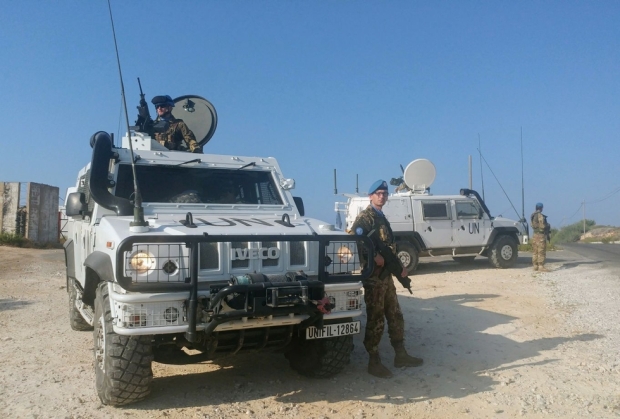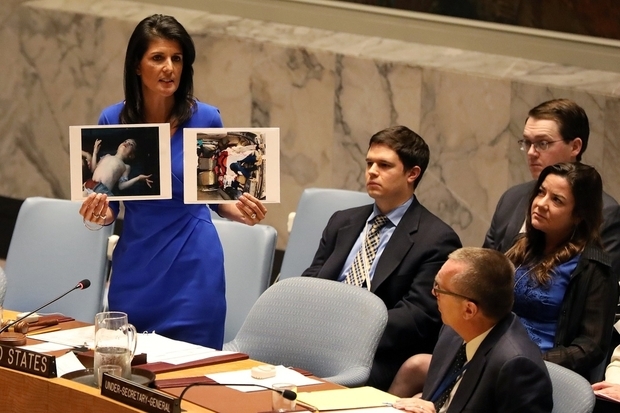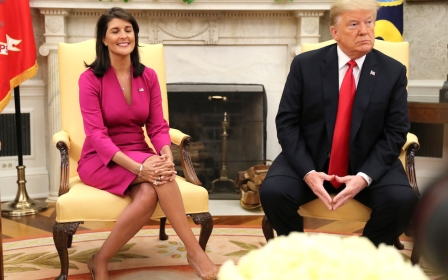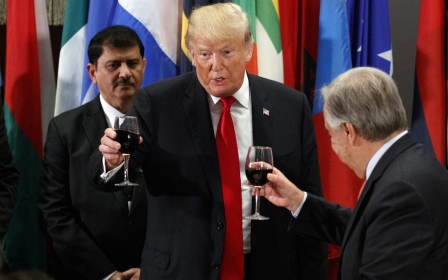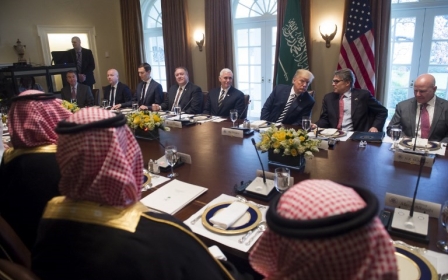Nikki Haley's key UN moments: From 'taking names' to rebuking Palestinians
Nikki Haley will leave her post at the United Nations after two years often spent serving as the face of US foreign policy, a role traditionally played by the secretary of state.
Throughout her tenure, Haley has rebuked Iran, scolded Palestinians and defended Israel, all while pushing President Donald Trump's "America first" agenda.
Despite spearheading Trump's unilateral approach to global diplomacy, Haley's relatively composed temper compared to other administration officials earned her a reputation for being less unhinged than the president.
A Quinnipiac University poll earlier this year found that 63 percent of respondents, including 55 percent of Democrats, approve of the job she was doing.
On Tuesday, the New York Times appeared to bemoan Haley's departure, describing her on Twitter as a "moderate Republican voice".
"I think she executed Trump's policies in a way that cleansed them from the reality that they represent, which regrettably, during her tenure, meant increased oppression of human rights abroad and decreased our standing in the world," Maya Berry, executive director of the Arab American Institute (AAI), told Middle East Eye.
Berry added that Haley had "particular disdain for Palestinian human rights".
Here are the key moments during Haley's tenure that generated headlines during the past two years.
Rejecting Salam Fayyad because he is Palestinian
A few weeks after her appointment, Haley blocked the appointment of former Palestinian Prime Minister Salam Fayyad as UN envoy to Libya.
At the time, UN Secretary-General Antonio Guterres had told the Security Council that he intended to name Fayyad to lead international efforts to end the crisis in the North African country.
But Haley objected. The reason? He is Palestinian.
"The United States does not currently recognise a Palestinian state or support the signal this appointment would send within the United Nations," she said in a statement in February 2017.
Haley went on to slam the UN, calling it "unfairly biased in favour of the Palestinian Authority to the detriment of our allies in Israel".
Haley had made her criticism of the UN over Israel known during her confirmation hearing in the US senate in early 2017, as well.
"Nowhere has the UN’s failure been more consistent and more outrageous than in its bias against our close ally Israel," she said at the time.
Denouncing 'blind' UN peacekeeping force in Lebanon
The routine, annual renewal of UN peacekeepers in Lebanon (UNIFIL) hardly ever makes the news. But in the summer of 2017, the force came under repeated criticism from Haley, who threatened to halt its renewal if it didn't do more to combat Hezbollah.
She called UNIFIL commander Major General Michael Beary "blind" to what is happening in Lebanon, demanding that peacekeepers do more to stop the "massive flow of illegal weapons to Hezbollah".
UNIFIL's mandate does not allow the international troops to confront Hezbollah but requires them to merely report armed presence in their area of operation to the Lebanese Armed Forces.
The troops' renewal eventually passed after Haley succeeded to add language to the UN Security Council Resolution urging UNIFIL to "take all necessary action" to stop violations in south Lebanon. The amendment did not affect the way UNIFIL operates.
In an interview with MEE last year, UNIFIL spokesperson Andrea Tenenti defended the force.
"I don't see the blind eye. We have a very vigilant eye... The mission has a very strong role, and the 11 years of peace show that the role is not only understood by the people of the south, but also understood by the (conflict's) parties," he said.
Alleged chemical attacks in Syria (2017 and 2018)
Despite his professed scepticism towards military interventions, Trump ordered two sets of strikes against Syrian government targets in 2017 and 2018, respectively, over accusations of chemical weapon use.
On both occasions, Haley led the charge against President Bashar al-Assad and his Iranian and Russian backers at the UN.
In April 2017, Haley displayed photos of dead children, alleged victims of the chemical attack in Syria, at the Security Council chamber.
"Yesterday morning, we awoke to pictures, to children foaming at the mouth, suffering convulsions, being carried in the arms of desperate parents," she told the council after an alleged attack in northern Syria's Idlib province. "We saw rows of lifeless bodies. Some still in diapers. Some with the visible scars of a chemical weapons attack."
A year later, after a supposed chemical attack in Ghouta near Damascus, Haley did not bring photos of victims, but she said: "The monster who was responsible for these attacks has no conscience to be shocked by pictures of dead children… The Russian regime, whose hands are also covered in the blood of Syrian children, cannot be shamed by pictures of its victims."
Damascus and Russia deny using chemical weapons and accuse the United States of backing hardline rebels that they describe as "terrorists".
Trump's strikes in Syria had a negligible effect on the war in Syria, but the president's detractors pointed to the "double standard" of aiming defending Syrians from their own governments while dehumanising and rejecting Syrian refugees fleeing the war.
'The US will be taking names'
Promising rewards and threatening potential punishment are not uncommon tactics in international relations, but they are seldom made public.
However, before the UN General Assembly moved to overwhelmingly denounce Washington's decision to move its embassy in Israel to Jerusalem, Haley warned foreign nations - via Twitter - against voting for the resolution.
Her Twitter diplomacy failed. A few days later, on 21 December 2017, 128 states voted to condemn the US for recognising Jerusalem as the capital of Israel. Only nine countries, including the US itself, Israel and four tiny islands in the Pacific, sided with Washington.
"To its shame, the United States has long been a hostile place for the state of Israel," she said at the General Assembly meeting.
Earlier in December, Haley vetoed a Security Council resolution criticising the embassy move.
"What we witnessed here today in the Security Council is an insult. It won't be forgotten. It's one more example of the United Nations doing more harm than good in addressing the Israeli-Palestinian conflict," she said then.
Berry, of AAI, said Trump's Haley-backed policies against Palestinians, including cutting funds to UN agency for Palestinian refugees, moving the embassy to Jerusalem and halting aid to hospitals that serve Palestinians in East Jerusalem, have "harmed people's lives in a very meaningful way in the region".
"She was perfectly happy enforcing policies that harmed our national security, standing in the world and that were, frankly, morally bankrupt," Berry said.
Leaving meeting as Palestinians speak
After Israeli forces killed dozens of peaceful Palestinian protesters in a single day in Gaza in May, Haley praised Israel for showing "restrain".
The protests coincided with the US embassy move to Jerusalem, but Haley dismissed the link between the two sets of events.
When the Palestinian delegation began to speak, Haley left the Security Council chamber.
Berry said the incident demonstrated how undiplomatic the US chief diplomat is.
"I think it was indicative of a way of operating that reflected the president that she served well."
'They loved how honest he is'
Haley defended Trump after he became the subject of ridicule after receiving unsolicited laughs from world leaders during his speech at the UN General Assembly in September.
Trump opened his speech by bragging about his own domestic record - a common act at home that was received comically by UN attendees.
"In less than two years, my administration has accomplished more than almost any administration in the history of our country. America's so true," Trump said.
His audience laughed.
The US president chuckled and added: "I did not expect that reaction, but that is ok," causing the laughter to grow louder.
Haley opined that world leaders and top diplomats laughed out of admiration.
"They loved how honest he is," Haley said on Fox News. "It’s not diplomatic and they find it funny."
'Evidence' against Iran
In December 2017, Haley presented pieces of shrapnel and weapon fragments as evidence that Iran was illegally supplying Yemen's Houthi rebels with ballistic missiles.
"You will see us build a coalition to really push back against Iran and what they're doing," Haley told a news conference at the time, as a charred, rusty cylinder that she said was from an Iranian missile fired by the Houthis on Saudi Arabia.
"This is not just about the nuclear programme. This is about everything else they're doing," she said, calling for international measures against Iran.
Tehran dismissed the presentation as a distraction from the US-backed Saudi abuses in Yemen.
"These accusations seek also to cover up for the Saudi war crimes in Yemen, with US complicity, and divert international and regional attention from the stalemate war of aggression against the Yemenis," the Iranian mission to the UN said in a statement at the time.
Iranian Foreign Minister Javad Zarif tweeted a photo of Haley side by side with former secretary of state Colin Powell making the case for the invasion of Iraq at the United Nations.
Stay informed with MEE's newsletters
Sign up to get the latest alerts, insights and analysis, starting with Turkey Unpacked
Middle East Eye delivers independent and unrivalled coverage and analysis of the Middle East, North Africa and beyond. To learn more about republishing this content and the associated fees, please fill out this form. More about MEE can be found here.


